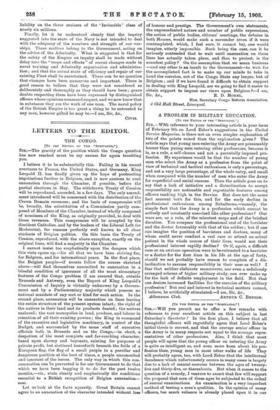LETTERS TO THE EDITOR.
THE CONGO.
[To THR EDITOR Or TUN " se genToR.-i
SrE,—The gravity of the position which the Congo question has now reached must be my excuse for again troubling you.
I believe it to be substantially this. Failing in his recent overtures to France, the United States, and Germany, King Leopold fl. has finally given up the hope of protracting negotiations further in Belgium, and is now anxious to rush annexation through the Chamber, if possible, before the partial elections in May. The withdrawn Treaty of Cession will be reproduced, amended, in a few days. The only amend- ment introduced will be concerned with the distribution of the Crown Domain revenues; and the basis of compromise will be, broadly, the substitution of a Commission partly com- posed of Members of the Chamber, instead of wholly composed of nominees of the King, as originally provided, to deal with those revenues. This compromise will be accepted by the dissident Catholics, and by the leaders of the Liberal Left (or Moderates), for reasons perfectly well known to all close students of Belgian politics. On this basis the Treaty of Cession, reproduced, with the above exception, exactly on the original lines, will find a majority in the Chamber.
I cannot insist too emphatically upon the dangers which this vista opens up,—for all that we have been striving for, for Belgium, and for international peace. In the first place, the Belgian people—if events follow the course sketched above—will find themselves committed to annexation in a blissful condition of ignorance of all the most elementary features of the Congo problem (I am assured that, outside Brussels and Antwerp, even the Report of King Leopold's Commission of Inquiry is virtually unknown) by a Govern- ment and by a Parliamentary majority which possess no national mandate of any sort or kind for such action. In the second place, annexation will be annexation on lines leaving the entire structure of the present system intact ; the right of the natives in their land and its products denied ; the natives enslaved; the vast monopolies in land, produce, and labour in retention of all their existing powers ; the King in command of the executive and legislative machinery, in control of the Budget, and surrounded by the same staff of executive officials both in Brussels and on the Congo,—in short, a despotism of the most complete and far-reaching character, based upon slavery and bayonets, existing for purposes of private profit, but sheltered henceforth beneath the folds of a European flag, the flag of a small people in a peculiar and dangerous position at the best of times, a people unconsulted and ignorant of the issues. The only way in which this con- summation can be prevented is for our Government to do that which we have been begging it to do for the past twelve months,—viz., state clearly and emphatically the conditions essential to a British recognition of Belgian annexation— now.
Let us look at the facts squarely. Great Britain cannot agree to an annexation of the character intended without loss
of honour and prestige. The Government's own statements, the unprecedented nature and number of public expressions, the action of public bodies, citizens' meetings, the debates in both Houses, would make such a surrender (even if it were contemplated, which, I feel sure, it cannot be), one would imagine, utterly impossible. Such being the case, can it be seriously contended that to wait until annexation on these lines has actually taken place, and then to protest, is the soundest policy P On the assumption that we mean business —and any other is an insult to the Government—to wait for the accomplished fact is to make up our minds to take in hand the coercion, not of the Congo State any longer, but of Belgium ; and if we have found it difficult to obtain support in dealing with King Leopold, are we going to find it easier to obtain support to impose our views upon Belgium P—I am,
Hon. Secretary Congo Reform Association. 4 Old Hall Street, Liverpool.




































 Previous page
Previous page